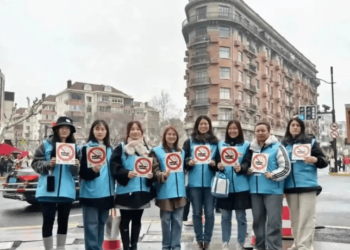
Mr. Wang, a resident of Zhenjiang, Jiangsu Province, submitted a report via the State Council’s “Internet + Supervision” platform. He stated that his wife, a foreign national, has been living in Zhenjiang for 20 years and obtained the “Permanent Residence Permit for Foreigners” in 2023. Nevertheless, after getting the permanent residence permit, she was still unable to apply for the urban and rural residents’ pension insurance due to not having a household registration (hukou) in Zhenjiang.
Upon receiving the report, the Supervision Office of the State Council carried out an initial verification and then forwarded the issue to the Jiangsu Provincial Government for further investigation.
After receiving the forwarded report from the Supervision Office of the State Council, the Jiangsu Provincial Government attached great significance to the issue raised by the public. It immediately assigned the task to the Jiangsu Provincial Department of Human Resources and Social Security and the Zhenjiang Municipal People’s Government for investigation and handling.
After an investigation, it was confirmed that the issue reported by the public was accurate. According to current national regulations, foreign individuals with a “Permanent Residence Permit for Foreigners” who live in China but are unemployed and meet the local requirements are eligible to participate in the urban residents’ basic medical insurance and urban residents’ social pension insurance and are entitled to social insurance benefits (Article 9 of the “Measures for Foreigners in China to Enjoy Relevant Benefits under Permanent Residence” [Ministry of Human Resources and Social Security Document No. 53, 2012]). However, since Zhenjiang’s Jingkou District had never encountered such cases before, no local policy had been formulated to address the participation of foreigners with the “Permanent Residence Permit for Foreigners” in the urban and rural residents’ pension insurance program. According to the “Implementation Measures for the Urban and Rural Residents’ Basic Pension Insurance in Zhenjiang City” (Zhenjiang Municipal Government Regulation No. 8, 2015), which stipulates that “urban and rural residents with local household registration who are over 16 years old (excluding students) and are not employees of state organs, public institutions, or enterprises covered by the basic pension insurance system can voluntarily participate in the urban and rural residents’ basic pension insurance at their place of household registration,” Mr. Wang’s wife was not able to participate in the urban and rural residents’ pension insurance.
After research by the Jiangsu Provincial Department of Human Resources and Social Security and the Zhenjiang Municipal Bureau of Human Resources and Social Security, it was clarified based on the “Measures for Foreigners in China to Enjoy Relevant Benefits under Permanent Residence” [Ministry of Human Resources and Social Security Document No. 53, 2012] issued by 25 departments that foreigners with permanent residence in Zhenjiang are eligible to participate in the urban and rural residents’ pension insurance in the city (county, district) where they live and can enjoy the relevant pension benefits as per the regulations. As a result, Mr. Wang’s wife can now apply for the urban and rural residents’ pension insurance under this policy.
Meanwhile, Jiangsu Province is earnestly implementing the spirit of the “more open talent policy” as stipulated in the “Measures for Foreigners in China to Enjoy Relevant Benefits under Permanent Residence” [Ministry of Human Resources and Social Security Document No. 53, 2012], which states that foreigners with a “Permanent Residence Permit for Foreigners” can use this permit as a valid ID to complete the procedures for participating in social insurance. The provincial government is conducting unified policy interpretation and business training across the province to ensure that human resources and social security departments, especially front – line staff, can accurately understand and implement the policy, thus ensuring the effective and efficient implementation of the national policy.



